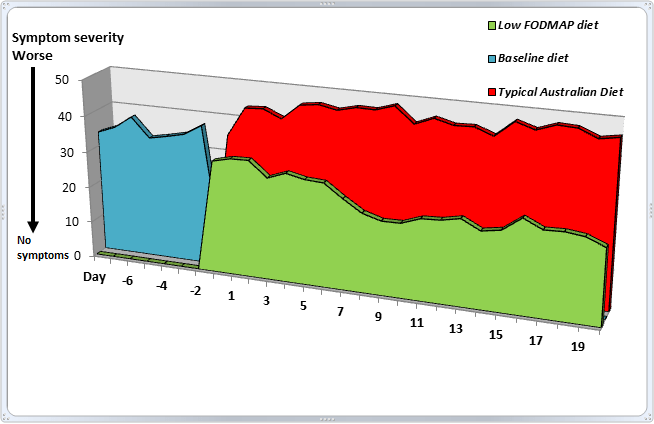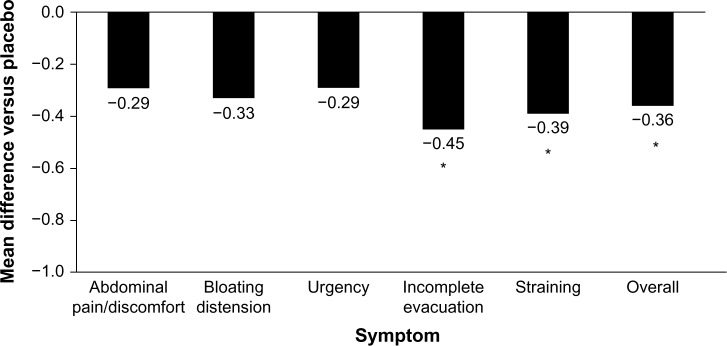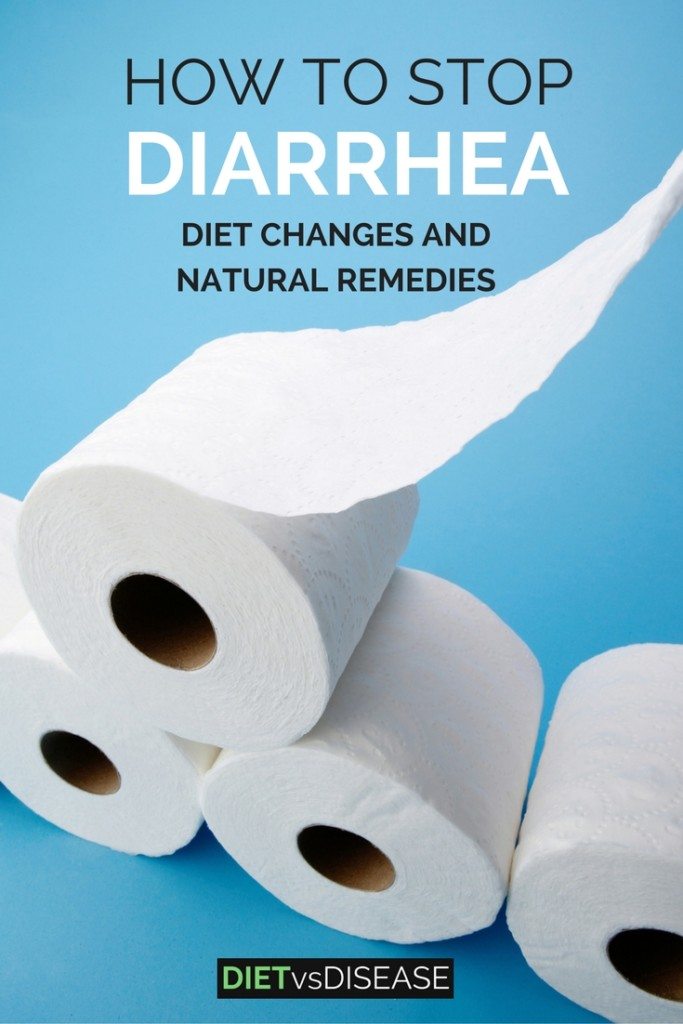Diarrhea is not a disease in itself, but rather a symptom of other issues.
Depending on the cause, diet changes can have a tremendous influence on prevention and treatment.
This article explores what is scientifically shown to help stop diarrhea.
Reasons for Diarrhea – Acute Vs Chronic

Diarrhea can be classified as either chronic or acute.
Acute diarrhea is usually the result of an infection from a bacterium, virus or parasite.
It can last from a few hours to a few days and in most cases will clear up on its own (1).
Chronic diarrhea typically lasts 4 weeks or more and can be continuous or stop-start. Numerous medical conditions such as celiac disease, IBS and IBD can cause it.
This article will focus on remedies for treating chronic diarrhea.
Summary: Acute diarrhea is brief, whereas chronic diarrhea lasts 4 weeks or more. The focus in this article is on chronic diarrhea.
Treat IBS or FODMAPs Sensitivities
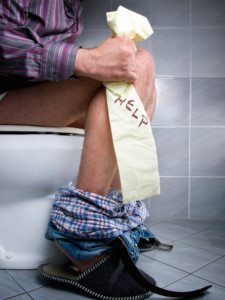
Irritable bowel syndrome (IBS) and food intolerance are one of the most common causes of chronic diarrhea in Western countries.
IBS presents in several forms including constipation predominate (IBS-C), diarrhea predominant (IBS-D) and mixed (IBS-M) (2).
Fortunately, it’s possible to manage IBS-D through diet modifications, such as following a low FODMAP diet.
FODMAPs are naturally occurring carbohydrates found in foods – such as fruits, grains and legumes – that can cause diarrhea and related digestive issues in sensitive people.
Systematically removing FODMAPs from the diet is the only scientifically proven way to manage IBS. This is known as the Low FODMAP diet, which you can learn more about here.
Image source. Click to enlarge.
The same systematic process is required to identify other food intolerances. That is, keeping a food and symptom diary and seeking supervision and advice from a specialist dietitian (3, 4).
Summary: A primary cause of diarrhea is unmanaged IBS or food intolerance. The low FODMAP diet is the only proven method for treating this condition.
Probiotics for Treatment of Diarrhea
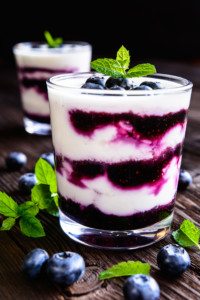
Probiotics are beneficial bacteria that can improve digestive health.
Some studies show they can help treat certain types of acute diarrhea, but their use for chronic diarrhea is not so clear (5).
The best evidence so far is on those with IBS, but the most beneficial strains of probiotic bacteria (and at what dose) is in the early stages of research (6, 7, 8).
In a study of 362 IBS participants, overall symptoms and self-reported “bowel habit satisfaction” improved by more than 20% after 4 weeks, compared to a control group taking a placebo.
The effective strain was Bifidobacterium infantis at a dosage level of 1 x 10(8) cfu per day (9).
Image source. Click to enlarge
The above image illustrates average reduction of IBS symptoms with Bifidobacterium infantis capsule administered once daily vs placebo.
If you choose to try a probiotic it should be taken for a minimum of 4 weeks to assess effectiveness.
Additionally, some products may contain ingredients high in FODMAPS which needs to be considered first (10).
Summary: Early research indicates certain probiotic strains can be beneficial for managing chronic diarrhea. A probiotic supplement is worth consideration, but make sure it does not contain high FODMAP ingredients.
Does Fibre Help Stop Diarrhea?
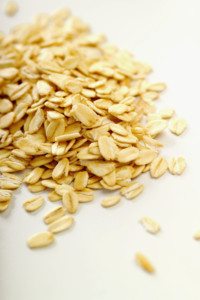
Fibre is a type of indigestible carbohydrate that can influence health.
There are two different types found in varying proportions in plant foods:
- Soluble: Mixes with water in the gut and is commonly found in oats, nuts, seeds and legumes. Soluble fibre helps to improve metabolic health and regulate bowel movements (11).
- Insoluble: Does not mix with water and passes through the digestive system largely in tact. Insoluble fibre acts as “food” for gut bacteria, necessary to maintain a balanced microbiota. It can also increase bulk, improving the transit time of stools through the gut (12, 13).
A high fibre intake is beneficial for health, regardless of your bowel habits.
Several studies have investigated the effects of soluble fibre supplements (also known as bulking agents) on IBS. It seems overall they do not reliably reduce symptoms, although not all of these studies looked at diarrhea specifically (14, 15, 16).
A recent meta-analysis did conclude that soluble fibre may reduce global IBS symptoms, but this was not specific to diarrhea (17).
Based on patient feedback it seems the effectiveness of bulking agents varies between individuals. They require a bit of trial and error and should be introduced gradually.
To learn more about the best fiber supplements, visit What is the Best Fiber Supplement?
Summary: A high fibre intake is thought to help maintain good digestion and bowel health. Some individuals may see an improvement in IBS symptoms with soluble fibre supplements, but its effect on diarrhea is unconfirmed.
Limit Foods Known To Cause Digestive Stress

Certain foods and drinks can irritate the digestive system and make symptoms worse.
It’s beneficial to strictly limit these when experiencing diarrhea.
- Coffee: Caffeine can have a stimulative effect on the intestinal tract. This speeds up the transit time of food during digestion and can make symptoms worse (18).
- Spicy foods: Capsaicin is the compound in chillies and peppers that causes the spicy flavour. It can irritate the intestinal tract and worsen symptoms (18).
- Alcohol: Alcohol can irritate the digestive system and speed up the passage of stools (19).
- High-fructose foods: Fructose is a type of sugar common in fruit, and is also a FODMAP. Excessive fructose intake, even in those who aren’t sensitive, can cause diarrhea because it pulls water into the digestive tract (20).
- High fat foods: High fat, fried and oily foods may not digest properly, causing discomfort and diarrhea in some people. It is best to minimise these types of foods when experiencing an episode (18, 20).
Summary: Certain foods and compounds are known to make diarrhea symptoms worse. Avoid these foods if you are symptomatic.
Low Intensity Exercise Can Help

Regular low to moderate-intensity exercise is thought to help with digestive issues.
The mechanisms why are not yet fully understood, but improved gut motility and increased release of digestive hormones may contribute (21).
Yoga specifically may be help reduce diarrhea in cases of IBS-D (22).
Some experience pain and diarrhea during intense exercise, especially when running long distances. This is often referred to as “runner’s gut”, which you should learn more about if you are an avid runner.
Summary: Regular exercise can help with digestive issues, particularly yoga. However, long distance running and high-intensity training can make things worse.
Natural Remedies for Diarrhea
There are several natural remedies and alternative treatments thought to improve digestive stress, at least in IBS patients.
- Peppermint oil: This appears to be beneficial in reducing global IBS symptoms, however there is less evidence available for treating diarrhea specifically (23, 24).
- Charcoal tablets: There is some evidence this can reduce flatulence and abdominal pain in some IBS patients. However, it’s unproven for diarrhea (25).
- St John’s Wort: Several trials have shown improvements in IBS symptoms when supplementing daily, however results are inconsistent. It appears far more useful for depression (26, 27).
A number of other herbal mixes have been trialed for IBS treatment, but there is no good evidence they help to stop diarrhea.
Summary: There are no natural remedies in the scientific literature that appear useful for treating diarrhea at this stage.
When Should I See The Doctor?
While diarrhea seems quite harmless, it can lead to dehydration and in severe cases malnutrition.
There are also medications that can help temporarily stop diarrhea. But unlike the Low FODMAP Diet, medication does not address the root problem and is more of a band-aid treatment.
In any case, you should always see your doctor if diarrhea lasts more than two days.
What Can And Can’t I Eat On The Low FODMAP Diet?
Often it’s easiest to start with this giant list I’ve made of what foods to eat, and what foods to avoid when following a low FODMAP diet.
It’s based on the latest published FODMAPs data (1, 2, 3, 4, 5).
Print or save to your phone to use as a quick-reference guide when shopping or cooking. I’ve attempted to list foods in both US and UK/Aus names, with US first.
I’ve included a screenshot of the first page below. But the full PDF is 4 pages and suitable for printing. To download it simply tap the box below and it will then be emailed straight to you – it’s free!


